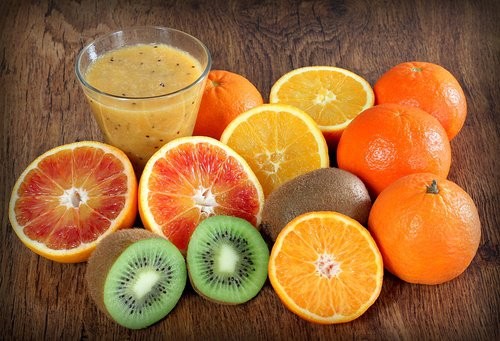
In addition to reducing our salt intake as a condiment, it's essential that we also monitor the products we consume, as many can contain it and be harmful to us.
You may not know it, but if you have kidney stones, it's essential to follow a healthy diet tailored to your condition. Diet can either eliminate or cause kidney stones to grow. You'll learn more in this article.
What to know about kidney stones
Before moving on to information about foods you shouldn't eat if you're prone to kidney stones, it would be good for you to know certain aspects about this condition.
A kidney stone forms from microscopic particles known as crystals. In most people, compounds in urine prevent the formation of these masses, but this is not the case in all organisms. The most common type of stone is made up of oxalate and calcium (75% of cases). Each patient may require different treatment depending on the stone that has formed. It also depends on the size and frequency of its appearance. Symptoms or signs of kidney stones include:
- Pain in the lower back (below the ribs) and on the sides of the spine.
- Intense pain for periods of 20 to 60 minutes.
- Discomfort that reaches the abdomen and groin.
- Blood in the urine.
- Dark urine with a very unpleasant smell.
- Pain when urinating.
- Constant urge to urinate (and go to the bathroom and only see a few drops)
- Nausea
- Vomiting
- Shivers
- Fever (if there is infection)

Symptoms or signs of kidney stones
Diet and kidney stones
Diet may be enough to prevent new stones from forming. Your doctor will most likely recommend limiting your salt intake, as well as other nutrients, such as:
- Calcium
- Sodium
- Oxalate
- Potassium
- Proteins
If you have a calcium stone, it's vital to stop consuming salt in all forms (including highly salted or pre-prepared foods). You should also minimize the calcium intake in each meal. However, it's important to keep in mind that this can lead to other problems, such as osteoporosis or bone loss. People who have suffered from oxalate stones need to reduce their consumption of all foods containing this compound. These include:
- Peanuts
- Coffee
- Beet
- Beans
- Blackberries
- Strawberries
- Raspberries
- Currants
- Rhubarb
- Grapes
- Chocolates
- Parsley
- Green leafy vegetables (especially spinach)
- Oranges
- Beet
- Wheat flour
- Strawberries
- Beer
- Brewer's yeast
- Tofu
- Pepper
- Walnuts
- Sweet potato
At the same time, it's been confirmed that a diet high in sugar can be a determining factor in the formation of stones. This is because it interferes with the metabolism of calcium, magnesium, and minerals found in the body. And be careful with soft drinks and artificial juices! Even if the label indicates they're low in calories, they still contain a significant amount of sugar and don't count toward the daily fluid intake. For both types of stones, it's recommended to increase your fluid intake. This will help prevent new stones from forming or prevent kidney stones from increasing in size.
- Age
- Weight
- Sex
- Height
- Activities carried out
- Time of year
- Additional diseases (obesity, diabetes, cholesterol)
Urine with a lower concentration of waste and more water reduces the risk of kidney stones forming. The only way to achieve this is by drinking fluids. In addition to mineral water, you can opt for natural infusions and homemade juices. An important dietary consideration is the amount of protein consumed. Several studies have confirmed that animal protein sources can be harmful for people vulnerable to kidney stones. It's not a question of becoming a vegetarian if you don't want to, but it is important to pay attention to your weekly intake of these types of meats: Eggs and dairy products also contain this type of protein. Reduce, as much as possible, recipes that contain a lot of milk, cheese, or butter. And what about vitamins? Some can be good, others bad, and there are those that have no impact on kidney stone formation:
- Vitamin B (including niacin, riboflavin, and thiamin): These vitamins do not have harmful effects on patients with kidney stones. Remember that vitamin B2 can give urine a more yellowish tint. This can be a hindrance when analyzing the color during a painful episode.
- Vitamin C: Citrus fruits and various fruits and vegetables have high levels of this vitamin. While it's good for preventing the flu and boosting immune system function, it can be one of the causes of kidney stones. Therefore, it's vital that you reduce your intake of all foods high in vitamin C.

Separate chapter for sodium
We've already talked a bit about salt intake, but it's worth taking advantage of these last few lines to point out that it's the single most important factor in the development of kidney stones. These organs must work twice or three times as hard if we eat too much salt. When a specialist tells us to reduce sodium, what we're doing is stopping adding salt to our food. However, many of the products we buy at the market are full of sodium chloride, and it can be harmful. Among these foods, we can highlight:
- Instant soups
- Soup cubes
- Sausages
- Cold cuts
- Fast food
- Breaded foods
- Sodium bicarbonate
- Baking powder
So, as you know, pay close attention to the ingredients in everything you eat. You could be causing an increase in kidney stones without even realizing it!


The Cleansing Pack helps expel impurities and reduce inflammation in the liver, kidneys, pancreas, gallbladder, and bladder. Sold at the PRONAPRESA Health Food Store.






















































